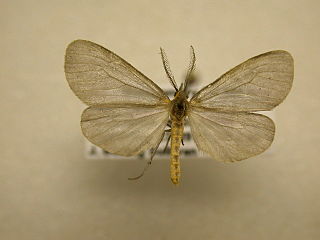
Pagara is a monotypic moth genus in the family Erebidae. Its only species, Pagara simplex, the mouse-colored lichen moth, is found in North America, where it has been recorded from Alabama, Arkansas, Florida, Georgia, Illinois, Indiana, Iowa, Kansas, Kentucky, Maryland, Mississippi, New Hampshire, North Carolina, Ohio, Oklahoma, South Carolina and Tennessee. Both the genus and species were described by Francis Walker in 1856.

Sciota subcaesiella, the locust leafroller moth, is a species of moth of the family Pyralidae. It is found in North America, including Maryland, New Jersey, Oklahoma, Iowa, North Carolina, South Carolina, Georgia, Alabama, Mississippi, Maine, New Hampshire, New York, Massachusetts, Pennsylvania, the District of Columbia, Virginia, Tennessee, Illinois, Missouri, Arkansas, Nova Scotia and Ontario.

Arta statalis, the posturing arta moth, is a species of snout moth in the genus Arta. It was described by Augustus Radcliffe Grote in 1875 and is the type species of its genus. It is found in North America including Delaware, Florida, Georgia, Illinois, Iowa, Massachusetts, New Jersey, New York, North Carolina, Oklahoma, Pennsylvania, South Carolina, Tennessee and Virginia.
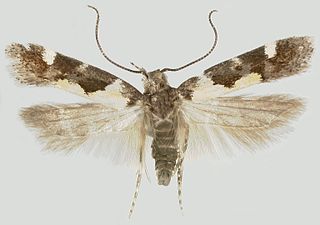
Stegasta bosqueella is a species of moth of the family Gelechiidae. It is found in North America, including Alabama, Florida, Georgia, Illinois, Iowa, North Carolina, Oklahoma, South Carolina, Texas and Virginia.

Heterocampa guttivitta, the saddled prominent moth, is a species of moth of the family Notodontidae. It is found in North America, including Alabama, Arkansas, Connecticut, Delaware, Florida, Georgia, Illinois, Indiana, Iowa, Kansas, Kentucky, Maine, Maryland, Massachusetts, Minnesota, New Brunswick, New Hampshire, New Jersey, New York, North Carolina, Ohio, Oklahoma, Ontario, Pennsylvania, South Carolina, Tennessee, Vermont, Virginia, West Virginia and Wisconsin.
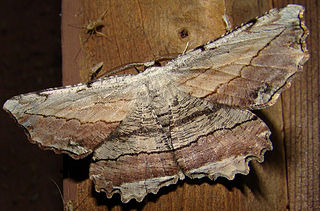
Lytrosis unitaria, the common lytrosis moth, is a species of moth of the family Geometridae. It is found in North America, including Arkansas, Georgia, Iowa, Massachusetts, New Hampshire, New Jersey, New York, North Carolina, Ohio, Oklahoma, Ontario, Pennsylvania, South Carolina, Tennessee, Texas, Virginia, West Virginia and Wisconsin.
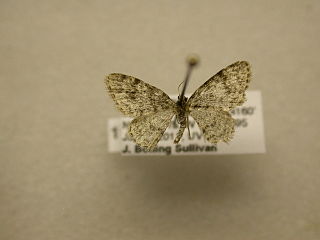
Hydrelia inornata, the unadorned carpet moth, is a moth in the family Geometridae. It is found in North America, including Indiana, Iowa, Kentucky, Maine, Maryland, Massachusetts, New Brunswick, New Hampshire, New York, North Carolina, Nova Scotia, Ohio, Ontario, Pennsylvania, Quebec, Saskatchewan, Tennessee and West Virginia.
Spilosoma latipennis, the pink-legged tiger moth, or the red-legged diacrisia, is a moth in the family Erebidae. It was described by Richard Harper Stretch in 1872. It is found in eastern North America, where it has been recorded from Georgia, Indiana, Iowa, Kansas, Kentucky, Maine, Maryland, New Brunswick, New York, North Carolina, Ohio, Ontario, Pennsylvania, South Carolina, West Virginia and Wisconsin.

Elophila gyralis, the waterlily borer moth, is a moth in the family Crambidae. It was described by George Duryea Hulst in 1886. It is found in eastern North America, where it has been recorded from Alabama, Florida, Georgia, Illinois, Indiana, Iowa, Louisiana, Maine, Maryland, Massachusetts, Michigan, Minnesota, Mississippi, New Brunswick, New Hampshire, New Jersey, New York, North Carolina, Nova Scotia, Ohio, Oklahoma, Ontario, Pennsylvania, Quebec, South Carolina, Tennessee, Texas and Wisconsin.

Dichorda iridaria, the showy emerald moth, is a moth of the family Geometridae. The species was first described by Achille Guenée in 1857. It is found in North America, where it has been recorded from Alabama, Arkansas, Florida, Georgia, Illinois, Indiana, Iowa, Kentucky, Maryland, Massachusetts, Mississippi, New Hampshire, New Jersey, New York, North Carolina, Ohio, Oklahoma, Ontario, Pennsylvania, Quebec, South Carolina, Tennessee, Texas, Virginia, West Virginia and Wisconsin.
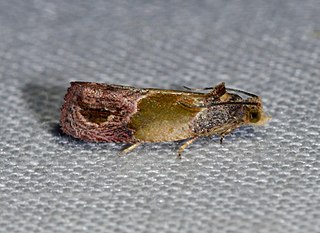
Eumarozia malachitana, the sculptured moth, is a species of moth of the family Tortricidae. It is found in eastern North America, where it has been recorded from Alabama, Arkansas, California, Florida, Georgia, Illinois, Indiana, Iowa, Kentucky, Louisiana, Maine, Maryland, Massachusetts, Minnesota, Mississippi, Missouri, New Jersey, North Carolina, Ohio, Oklahoma, Ontario, Pennsylvania, South Carolina, Tennessee, Texas, Virginia and West Virginia.

Metalectra tantillus, the black fungus moth, is a moth of the family Erebidae. The species was first described by Augustus Radcliffe Grote in 1874. It has been recorded from the US states of Alabama, Florida, Georgia, Illinois, Iowa, Kentucky, Maryland, Mississippi, New Jersey, North Carolina, Ohio, Oklahoma, Pennsylvania, South Carolina, Tennessee, Texas, West Virginia and Wisconsin.
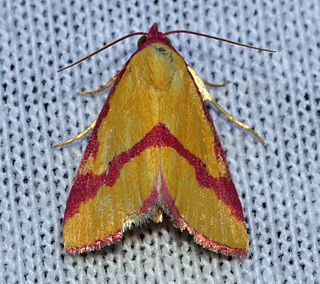
Phytometra ernestinana, Ernestine's moth, is a species of moth of the family Erebidae. It is found in North America, where it has been recorded from Alabama, Arizona, Florida, Georgia, Illinois, Indiana, Iowa, Kansas, Louisiana, Michigan, Mississippi, New York, North Carolina, Ohio, Oklahoma, Ontario, South Carolina, Tennessee, Texas and Wisconsin. It is also present in Cuba.
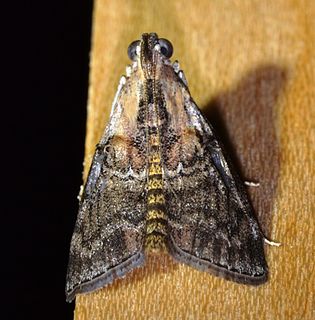
Pococera expandens, the striped oak webworm moth or double-humped pococera moth, is a moth of the family Pyralidae. It is found in North America, where it has been recorded from Arizona, Arkansas, British Columbia, Georgia, Illinois, Indiana, Iowa, Kentucky, Louisiana, Maine, Manitoba, Maryland, Massachusetts, Mississippi, New Brunswick, New Hampshire, New Jersey, New York, North Carolina, Ohio, Oklahoma, Ontario, Pennsylvania, Quebec, South Carolina, Tennessee, Texas, Virginia, West Virginia and Wisconsin.

Polygrammodes flavidalis, the ironweed root moth, is a moth in the family Crambidae. It is found in North America, where it has been recorded from Alabama, Florida, Georgia, Illinois, Indiana, Iowa, Kansas, Kentucky, Maryland, Mississippi, Missouri, New Jersey, North Carolina, Ohio, Oklahoma, Pennsylvania, South Carolina, Tennessee, Texas, Virginia, West Virginia and Wisconsin.

Glena plumosaria, the dainty gray moth or plumose gray moth, is a species of moth in the family Geometridae. It is found in North America, where it has been recorded from Alabama, Florida, Georgia, Indiana, Iowa, Kentucky, Maryland, New Jersey, North Carolina, Ohio, South Carolina, Tennessee and Virginia.

Hydriomena transfigurata, the transfigured hydriomena moth, is a moth of the family Geometridae. It is found in North America, where it has been recorded from Alberta, Florida, Georgia, Indiana, Iowa, Kentucky, Maine, Manitoba, Maryland, Massachusetts, Minnesota, Missouri, New Brunswick, New Hampshire, New Jersey, New York, Newfoundland, North Carolina, Nova Scotia, Ohio, Oklahoma, Ontario, Quebec, South Carolina, Vermont, West Virginia and Wisconsin.
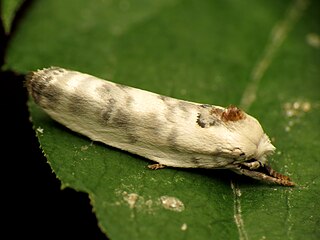
Antaeotricha leucillana, the pale gray bird-dropping moth, is a moth in the family Depressariidae. It was described by Philipp Christoph Zeller in 1854. It is found in North America, where it has been recorded from New Hampshire, Massachusetts, New York, Pennsylvania, District of Columbia, Virginia, North Carolina, Georgia, Alabama, Arkansas, Missouri, Kansas, Illinois, Iowa, Texas, Oregon, Louisiana, Manitoba and Nova Scotia.

















